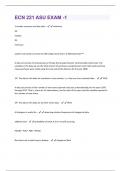Summary
Summary Table: External Relations of the EU – External Representation
- Course
- Institution
This summary table provides a streamlined overview of the External Representation of the EU, covering key aspects such as: • Roles of HR/EUCO in Representation • Union Delegates • European External Action Service (EEAS) • EU Representation in International Organisations (IOs) �...
[Show more]












